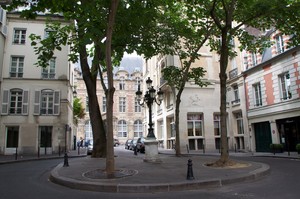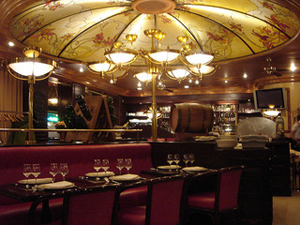Two Encounters

- SUBSCRIBE
- ALREADY SUBSCRIBED?
BECOME A BONJOUR PARIS MEMBER
Gain full access to our collection of over 5,000 articles and bring the City of Light into your life. Just 60 USD per year.
Find out why you should become a member here.
Sign in
Fill in your credentials below.
 If I could remember exactly when it happened, I would tell you. The second encounter is clear enough—about this time, last year and on a smallish street that opens out into a square, which is actually a circle, with a handsome, old-fashioned, five-globed street-light in the center and full of tall trees, most likely horse chestnuts. I come here from time to time because its old familiar surprise is still surprising: between two busy streets in a tourist-beaten part of the Sixth Arrondissement, it is always nearly empty and as close to silent in the middle of a sunny day as any street in Paris can be before two o’clock in the morning. A good place, you know, to get the crap out of my eyes and the noise out of my ears.
If I could remember exactly when it happened, I would tell you. The second encounter is clear enough—about this time, last year and on a smallish street that opens out into a square, which is actually a circle, with a handsome, old-fashioned, five-globed street-light in the center and full of tall trees, most likely horse chestnuts. I come here from time to time because its old familiar surprise is still surprising: between two busy streets in a tourist-beaten part of the Sixth Arrondissement, it is always nearly empty and as close to silent in the middle of a sunny day as any street in Paris can be before two o’clock in the morning. A good place, you know, to get the crap out of my eyes and the noise out of my ears.
I had come in from the south, and why I always do I cannot tell you, and walked around to the left of the magnificent street light, passing close to the door of a small museum which is payant and not worth the price of admission. A woman was coming out just then, a step or two ahead of two women and, as I passed them, she turned to talk to one of the others, so I could see her full-face. I had that strange and ordinary sense that I knew her or had met her or, for all I know, had been married to her. She noticed me, stopped for a moment, her mouth open, her eyes wide, then started walking away as fast as she could without actually breaking into a canter. I didn’t look back: I was looking inside, rummaging the file cabinet or, as Borges put it, the garbage heap that passes for my memory.
The memory stayed put, in with the old tax files and warranties for things I junked ages ago or the empty wine bottles and sardine tins. Two days ago, it floated to the surface. I don’t know why and I wish it had not. The best I can say is that I have worse and more unhappily fragrant memories that come and slap me on the back from time to time, so not to complain, Joe. Perhaps you won’t either. But it’s very sad.
The first encounter, I remember now, was in a café on Montparnasse that I used to like. It’s the kind of café that has brothers, cousins, step-sisters, in-laws and pen pals all over Paris, an ordinary place, but usually uncrowded and comparatively unnoisy, plain in décor, which is to say mousey, the seats comfortable enough for a two hours’ stay, but not much more unless you are generously padded aft. It is next to one of the famous cafés from the old days, one of those places that are evoked in memoirs and biographies and are supposed to make you feel all Hemingway or Sartre or who-knows-who all over, except Ernest and Jean-Paul and whatever-his-name-used-to- be are long and far beyond showing up anywhere these days.
 This café got by a little better than all its homely and banal relatives because it could pick up the overflow from the great place with a great history (and a dull present) next door. It may still, but I don’t like it. Starting a few years back, let’s say five, the management appeared to change twice a year. Or something changed. The servers were suddenly all different, their outfits were different, the menu was pretty much the same and to be avoided in any event, but it was printed differently. Some tables with chairs that faced one another north and south would suddenly face east and west. Nothing serious, you see, but if you want a homely, banal and ordinary café, you also want its homeliness, banality and ordinariness to be consistent… no, constant, eternal, reliable, one hundred percent chez moi. So they lost me.
This café got by a little better than all its homely and banal relatives because it could pick up the overflow from the great place with a great history (and a dull present) next door. It may still, but I don’t like it. Starting a few years back, let’s say five, the management appeared to change twice a year. Or something changed. The servers were suddenly all different, their outfits were different, the menu was pretty much the same and to be avoided in any event, but it was printed differently. Some tables with chairs that faced one another north and south would suddenly face east and west. Nothing serious, you see, but if you want a homely, banal and ordinary café, you also want its homeliness, banality and ordinariness to be consistent… no, constant, eternal, reliable, one hundred percent chez moi. So they lost me.
But the encounter was more than five years ago, more like ten, I’m guessing. And it was as ordinary and banal, at the start, as the café itself. I’d been perched there for the better part of an hour with a un petit chocolat and a little later a glass of something red and a book. I remember it was not a promising day, not cold enough to be bracing, but a little too windy to be out and about all day long, so I had made my way to Café Quelconque and retreated into chocolate, alcohol and Baudelaire. Time was, I thought that was Paris. Time is, I still think so.
The woman came in alone and, when nobody showed her where to sit, gingerly sat down two or three tables off to my left, looking from side to side uncomfortably. When the waiter showed up, it was clear that she had no French, though she may have thought otherwise, and he, who surely knew enough café English to guide the hapless, was not being helpful. And anyway, it’s an old habit of mine. I’m always on the lookout for the unfortunates qui se font baisés, and the waiter was really being more than unhelpful—more like gleefully making her miserable. I stood up, walked over and in my English which can almost pass for native asked her what she wanted. She told me, I told the waiter, suggested he smile a bit more, and went back to my table, my wine and my book.
When her food and drink came, she dug in hungrily, but after, I think, the first bite and sip, said Merci, monsieur, clearly to me. I answered in English that I was glad to help and thought I’d leave it there. She said, “This is my first time in Paris? I just got here? Maybe you could tell me some things to do?” The question mark at the end of what ought to be a declarative sentence is called, they tell me, a question tag—a feminine habit showing insecurity and need, according to the sociologists who have found their own need to name the phenomenon, but one I hear from young men these days as well. Annoying, a red flag. But I didn’t get it even when she said, “Would you mind joining me? I’d like to have someone to talk to?” I did.
Her name, she told me, was Carol, she was from upstate New York, she had never been out of the States before, she was divorced from her husband six years ago, she…
…she was somewhere in her mid-forties or maybe older, a bit overweight, maybe a little more than a bit, had chosen the wrong haircut, makeup and clothing. She wasn’t ugly, but certainly not pretty. An ordinary française or a sophisticated American woman, equally plain, would have had a better sense of style, would have consulted her girlfriends and her coiffeuse about the hair, her girlfriends and her visagiste about the makeup, and her girlfriends and her serveuse in her favorite store (assuming she could not pay the price for made-to-measure) about the clothes. Among the many women in my life, some did not do their hair so well, a couple had no idea about makeup, and others had troubles with their wardrobes, but none that I can remember seemed to get all three so far from what I would call their own style. And keep in mind that this is from a man who cares very little about hairstyles, makeup, and clothing. But he does care about what she is in front of him, with a prejudice these days for elegance, a sense of style, not fashion. Clearly, she was distracting me from her…
 …had had two years of high-school French, um, some time back, had been saving for quite a while to be able to afford the trip, but then got a big raise, and she wanted her first visit to be “memorable,” wanted her trip to Paris, and only to Paris, to punctuate her life, to put a period here and start a new paragraph there, with a side order of the moon and the stars, and would I like another glass of wine?
…had had two years of high-school French, um, some time back, had been saving for quite a while to be able to afford the trip, but then got a big raise, and she wanted her first visit to be “memorable,” wanted her trip to Paris, and only to Paris, to punctuate her life, to put a period here and start a new paragraph there, with a side order of the moon and the stars, and would I like another glass of wine?
Don’t ask me, but I said yes which meant another twenty minutes at least of her talk which was in its own sadly romantic way earnest. Carol was, it seemed to me, a very ordinary woman, with an ordinary divorce, job and grown children, hoping that her two or three weeks in Paris would change her… her life, her past and most certainly her future, and why not the present while we’re at it? She wanted Paris to be top-to-bottom cosmetic surgery for the soul, the world’s best acid trip, the fitting room for gossamer wings. Well, she wasn’t the first woman to think that. But I had finished my wine and was ready to go. She said she would be delighted if I ordered something to eat and we could keep talking, “You’re so interesting.” I had barely said anything, but said now I wasn’t very hungry and really had to go, shook her hand, said Bonne séjournée which I immediately translated, and left.
I walked down the street, around a corner, and found a table toward the back of a small place where the smoked salmon is always good. Five minutes into my meal, I noticed something off to my right. It was Carol who said, “So, we meet again?”—which I think is a phrase super-villains use in bad movies when they think they have Our Hero in their clutches. “May I join you?” I wanted to say no, I should have, and couldn’t, couldn’t embarrass her. She sat and I ordered her a glass of wine. She was less than sober, probably not much of a drinker anyway, and was getting starry and gooey. Paris is so romantic… always dreamed about… what more could a girl want…a city made for love… and what about you?
I told her as little as I could, as unromantic, undreamy and unwantable as possible. I wanted to tell her I was a Polish accountant staying in a fleabag, but she would have heard a Polish count who owns un faubourg. It would have made no difference because the bullet was already in the chamber and, no matter what, she was going to squeeze the trigger. She did. “You’re the kind of man, maybe the man, I’ve always dreamed about when I thought and hoped about Paris? I want to go to bed with you? Now? Please?”
Bless the waiter. He had picked up something about us and had deftly put my check on the table about five minutes before Carol fired her shot. I put money on the table, said, Thank you, Carol, it’s sweet of you, but I can’t… and you want…
I can’t remember how I squirmed out of that sentence. I got up and said goodnight. “Could you kiss me?” So I kissed her lightly on both checks and turned. She grabbed me and said, “Please? I’ve been thinking, hoping, so long… you know, I could pay you.” No question mark that time, and for the first time since I turned twenty, I was actually shocked. For all I know I knocked over half a dozen people as I escaped from the restaurant and kept going until I found an empty little runt of a street and started to cry, so help me, for poor, romantic, homely Carol who wanted a prince or maybe a fool like herself and had the bad luck to find only me.
photo 2 by IK’s World Trip [CC BY 2.0], via Flickr
photo 3 by Olivier Ortelpa [CC BY 2.0], via Flickr
More in french life, short story, story

